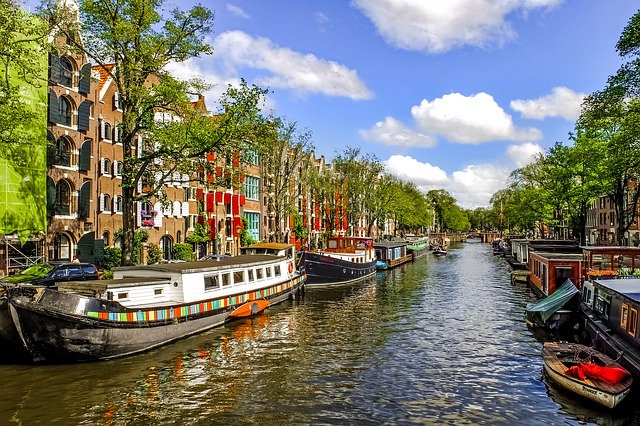 I moved to The Netherlands just over three months ago and my international relocation from Melbourne has coincided with the furious debate over the upcoming Australian postal vote on gay marriage. Perhaps debate is a slight overreach. It would be more accurate to say that those in Australia who are pro-gay marriage can just about say or do anything they want, from headbutting Australian politicians, to firebombing Catholic buildings and then conveniently dying before justice could be served. Whereas those on the No side of the equation are bad and evil people who must be punished for the sin of having an opinion and wishing to vote along those lines.
I moved to The Netherlands just over three months ago and my international relocation from Melbourne has coincided with the furious debate over the upcoming Australian postal vote on gay marriage. Perhaps debate is a slight overreach. It would be more accurate to say that those in Australia who are pro-gay marriage can just about say or do anything they want, from headbutting Australian politicians, to firebombing Catholic buildings and then conveniently dying before justice could be served. Whereas those on the No side of the equation are bad and evil people who must be punished for the sin of having an opinion and wishing to vote along those lines.
I have been observing these tumultuous events from afar, but not just from afar; from the very first country in the world to legalise gay marriage back in 2001. And so I decided to do a bit of digging, a bit of observation, and a bit of using my prodigious brain to examine the present situation in which I find myself – living in a country that gave homosexuals what they apparently so dearly desire. And the effect on the country and its population?
As far as I can tell, absolutely nothing at all.
Now if you happen to be of the pro-gay marriage persuasion, you may be tempted to knee-jerk yourself to a state of great excitement at that news. After all, do the progs not dismiss and mock the slippery slope arguments as a matter of routine? But this line of reasoning would be erroneous in the extreme. Gay marriage has had no ill effects in Dutch society due not to the supposed innocuous nature of gay marriage, but to the nature of the Dutch themselves.
To understand this it is necessary to take into account the historical precedents of liberalism. The Dutch more or less invented liberalism in the 16th and 17th centuries, and they have spent the following three hundred years perfecting its application to their culture and society as a whole. The Dutch are the most liberal people in the world. Check into a family hotel in Holland and you will find such random paraphernalia as anal lube and butt plugs in the pullout drawer next to your bed. The Dutch will just as casually state to the effectiveness of their sexual activity that morning as they will comment upon the weather. The red light districts and hashish coffee shops of Amsterdam attract hordes of young desperadoes from around the world.
And yet in all the time I have lived here I have never once identified a homosexual in public. I have never seen two men holding hands, let alone kissing. I have no doubt that there are homosexuals here but you wouldn’t know it to glance around. Contrast this with any Australian city and you can’t walk three paces without some random poof mincing his way across your field of vision.
I thought that this was very curious indeed. Sex is far from a taboo subject in Holland and yet the multitudes of enthralling beautiful young women dress demurely and with good taste. The Dutch invented gin and are enthusiastic consumers of all alcohol products but I have never seen the kind of drunken public behavior that characterises the Anglo-Saxon world. You can openly purchase hashish at your leisure but any native Dutch who use the drug seem to be looked down upon with a fair degree of pity. So what on earth is going on?
Yesterday The Z Man wrote an article that touches on this question:
“Russell Kirk argued that there are three cardinal ideas in Western civilization. There is the idea of justice, the idea of order, and the idea of freedom. Justice is the process that protects a man’s life, property, natural rights, status and his dignity. Order is the principle and the process to ensure that a people will have just leaders, loyal citizens, and public tranquility. Freedom is the principle that a man is made master of his own life.”
The last one is critical to this discussion. A man may only be master of his own life if he is beholden to the consequences of his actions. It is personal responsibility that determines the degree of freedom within a society. And the Dutch are very big on the idea of personal responsibility for oneself and for the consequences of their actions. Very big indeed.
This upholding of individual responsibility manifests itself in the public and social virtue that is personal restraint. The Dutch are absolutely fine with whatever you do behind closed doors, but they will not tolerate for a second any attempt to impose outside values upon them. In other words, gay marriage was passed in Holland but nobody was forced to bake cakes that they did not want to bake. And the Dutch wouldn’t even dream of forcing religions to go against their core beliefs and officiate gay marriages.
Gay marriage works in Holland because of the balance that is present within Dutch society. The Dutch are tolerant but expect tolerance in return. It is a two way street. The result is a society that is the most liberal and tolerant in the world but yet exhibits a strong family identity along with high levels of restraint and personal responsibility.
Anglo-Saxon nations such as Australia, the USA, Canada, and Great Britain have adopted the ideas of Dutch liberalism but without the corresponding balance of personal responsibility, or if the tenants of personal responsibility and restraint previously did exist they were nonetheless allowed to erode. In Australia the values of hard work, thrift, and personal sacrifice have been almost abandoned as more and more Australians have given themselves over to being dependent on the state, behavior which only a few generations ago would have resulted in a fair degree of shame. The Dutch are taxed to within an inch of their lives but the idea of mooching off their fellow citizens is anathema to them.
Gay marriage is not an option in Australia because, unlike The Netherlands, Australian society is not mature enough to handle such an eventuality. Whether Australia will ever reach the required level of maturity is another question. Based upon the social arc of the last fifty years it seems highly unlikely.
Gay marriage in Australia is about tearing down the religious institution of marriage. In Holland it was about letting homos get married.









